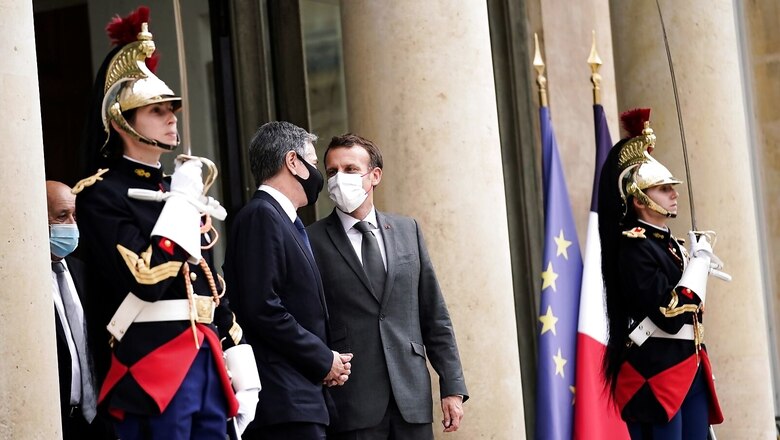
views
Secretary of State Tony Blinken met with French Foreign Minister Jean-Yves Le Drian and French President Emmanuel Macon in Paris Tuesday amid tensions between the two countries that — at least once in a TV interview — boiled to the surface.
A senior State Department official described Blinken’s official encounters as “very productive” and forward-looking, but both the US and the French agreed that work remains to mend the relationship rocked by the Biden administration’s new defence partnership with the UK and Australia.
Bitterness about that deal and the Biden administration’s treatment of the French punctuated an appearance Blinken made on France 2 TV, where the interviewer raised France’s anger, incomprehension and sense of betrayal — and then got personal.
“We expected better, especially with the change of administration, and especially with you,” journalist Anne-Sophie Lapix told Blinken. “You speak French. You are a Francophile. We expected a better dialogue.”
Blinken, who spoke French throughout the interview, said he understood the sense of betrayal and that Americans realise they “could have — we should have — done better, in terms of communication.” And he admitted that, “above all, we sometimes tend to take for granted a relationship as important and deep as the one between France and the United States.”
The senior State Department official acknowledged that when it comes to repairing the relationship, this trip is not “the end of the process by any means, we’re still in the early stages of doing that.” The official described Blinken’s Tuesday meetings with French officials as “serious” in tone.
“There was not much re-litigation” of the events leading up to the announcement of the security agreement between the US, UK and Australia that enraged the French and cost it billions in a defense contract it had expected to sell to Australia, the official said. The discussions focused on “using this as an opportunity” to develop and implement joint efforts on issues accords the board.
Here’s recapping the entire diplomatic row and where the powers stand now:
What’s the big deal about Blinken’s meet?
Blinken is the first senior US official to visit Paris since the announcement of a US-led security pact blindsided Paris, costing it billions in lost defence sales and rupturing diplomatic ties with Washington.
The US has been scrambling to remedy the breach with France since the “AUKUS” security pact with the UK and Australia was unveiled in mid-September, leading Paris to recall its ambassador, denounce the Biden administration’s action as “brutal” and — despite President Joe Biden’s pledge to prioritize close coordination with allies — decry its treatment of allies as no less callous than the Trump administration’s.
While Biden called the deal an investment in American alliances, the strategic move to bolster Australia’s military and counter China’s strengthening grip in the Pacific is said to have infuriated French President Emmanuel Macron.
Sylvie Kauffmann, the editorial director of France’s leading daily newspaper, Le Monde, wrote in The New York Times: “Make no mistake. This is a crisis, not a spat….French officials say they have been stonewalled and duped by close allies, who negotiated behind their backs.” The atmosphere is one in which the “sense of betrayal,” as she described it, is “acute.”
Hours later, Macron and Biden released a joint statement that read, “The two leaders agreed that the situation would have benefited from open consultations among allies on matters of strategic interest to France and our European partners.” Macron, who recalled the nation’s ambassador to the US for the first time in history, announced in the joint statement that ambassador Philippe Etienne would return to Washington.
Two days after the Biden-Macron conversation, France’s powerful Minister of the Armed Forces, Florence Parly, called America’s behavior “brutal” and noted its focus on China, saying, “In this strategic analysis, Europe counts less and less.”
Why is US cozying up to Australia with AUKUS?
Now that the US is locked in a competition with a new global power, Biden is venturing beyond NATO to cozy up to Australia — believing that this will more effectively protect US interests against China. That is the underlying rationale for throwing France under the bus: It seems the US believes neither France nor Europe has the will or ability to take on China.
Indeed, Macron said earlier this year that the EU shouldn’t gang up on China by taking sides with the US — a scenario he called “counterproductive.” Instead, he suggested walking a tightrope with China, viewing it as both a partner and competitor.
The European Parliament too voted on a new strategic outlook on China — one that mirrors Macron’s approach. The EU proposed strengthening ties to the major Asian democracies of India, Japan and South Korea as well as Taiwan, while cooperating with China when it comes to trading arrangements and climate change.
Biden, on the other hand, has chosen to amp up Australia’s military might before giving diplomatic talks with China a chance to succeed. Let’s not forget the angry confrontation between Secretary of State Antony Blinken and his Chinese counterpart in March — with each side accusing the other of gross human rights violations in a scene that was all too reminiscent of the Donald Trump era.
Macron-Biden drifting apart?
Macron certainly has a tough task ahead, with political hurdles at home while the rift between the US over China is likely to grow over time.
As for Biden, foreign policy under his administration — in Afghanistan, for example, and now with Australia — has not inspired confidence among many of America’s allies. For too many people in France, the early Biden era seems to be more of a continuum of what they saw under President Donald Trump than any dramatic shift.
For much of this century, France and the US have been drifting apart, beginning with France’s angry rejection of the American invasion of Iraq in 2003. This latest imbroglio seems only to be accelerating the drift. As Florence Parly, Minister of the Armed Forces, concluded, America’s “brutal” behavior “is not a surprise, it has been some years since we have noticed this fundamental trend.” It will take some masterly statesmanship by Macron and possibly a resounding second term as French president to reverse what seems to be a deep-seated, historical trend.
Can America soften the blow for France?
France will lose about $65 billion from an existing deal to provide Australia with conventional, diesel-powered submarines because of the new deal Australia reached with the US and the UK.
“Can the US financially soften the blow? This will be difficult. Could the US help identify another country to buy the French submarines?” said Heather Conley, a director for the Europe program at the Center for Strategic and international Studies, or CSIS, to CNN.
French officials have not been publicly explicit about what they want the US to do to get the alliance back on track. Some say they are waiting to see what Blinken puts on the table.
“The ball is in the US court,” explained a senior French official ahead of Blinken’s visit.
“We want to hear what the plan is from the US side to restore the quality of the transatlantic relationship. Since January, there has been a lot of rhetoric about friends and allies and, on a number of issues, the actions have not been much different than (Donald) Trump, so it will be: Are you genuinely interested in dealing with the EU and NATO and France in the way you deal with partners?”
(With inputs from CNN)
Read all the Latest News , Breaking News and IPL 2022 Live Updates here.



















Comments
0 comment